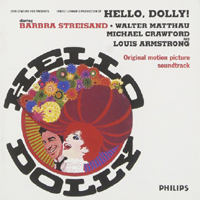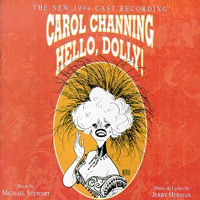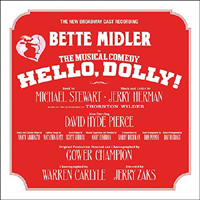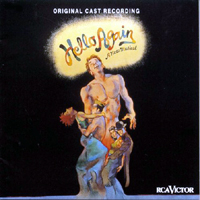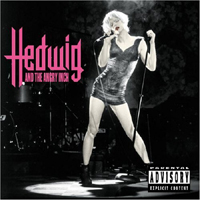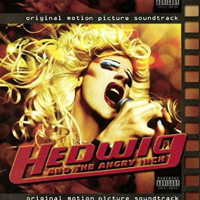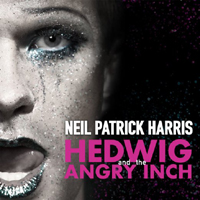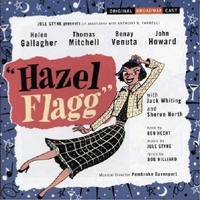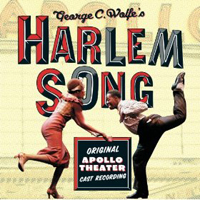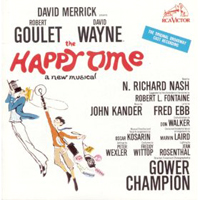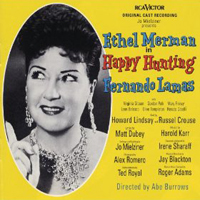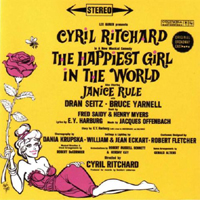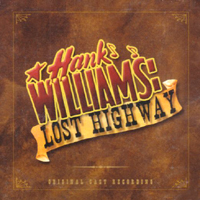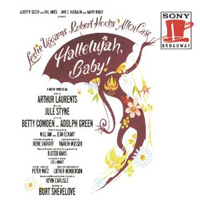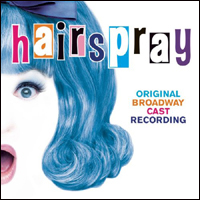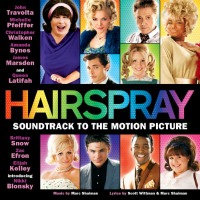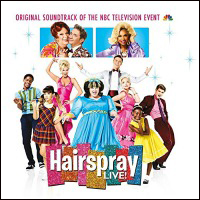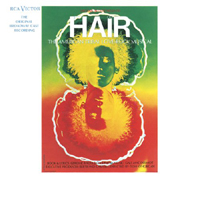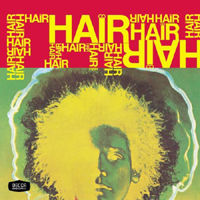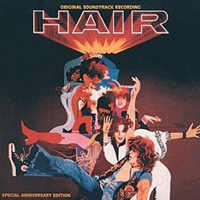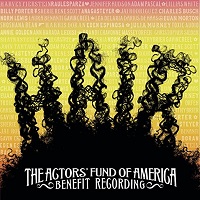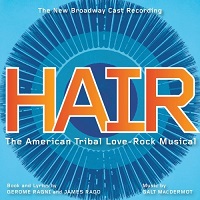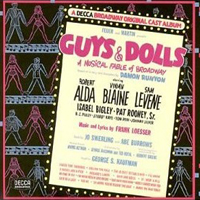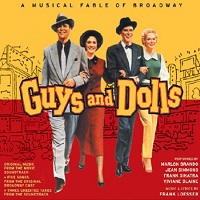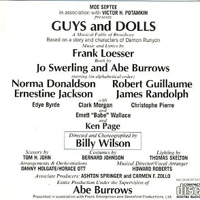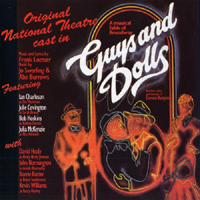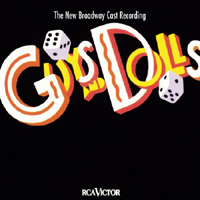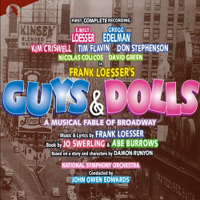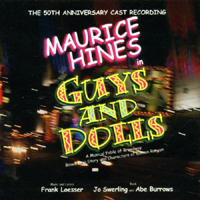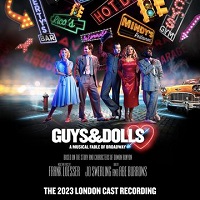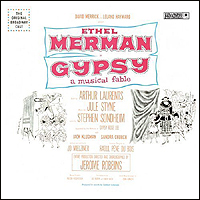 Original Broadway Cast, 1959 (Columbia/Sony)
Original Broadway Cast, 1959 (Columbia/Sony)  (5 / 5) From the blaring trumpets that begin the overture to the final chords of “Rose’s Turn,” this is a recording that grabs you and never lets go. Representing Jule Styne, Stephen Sondheim, and several other great musical theater artists at the peak of their powers, the flawlessly integrated musical Gypsy is further elevated by this album’s breathtaking performances. It’s clear that Ethel Merman knew she had the role of her career in Rose, and was going to make certain that the audio document of her performance would jump off of the vinyl on which it was originally released. In “Some People,” she just about shakes you by the shoulders with Rose’s ambition — and then she touches your heart with the character’s yearning in “Small World.” Later on, she both thrills and terrifies you in “Everything’s Coming Up Roses.” Finally, there’s her “Rose’s Turn,” a performance that may someday be equaled but will almost certainly never be surpassed: It’s a moment to-moment exploration of an emotional breakdown and breakthrough, the equivalent of several years of therapy in five minutes. The supporting cast is worthy of the star. Sandra Church is a totally convincing Louise, from her heartfelt “Little Lamb” to “Let Me Entertain You.” On Sony’s most recent CD edition of this original cast album, Church can be heard squealing with delight at the end of Paul Wallace’s flawless “All I Need Is the Girl,” a magnificent theatrical moment previously thought to be lost. Jack Klugman’s contributions to the recording are wonderful if not extensive. Maria Karnilova, Faith Dane,and Chotzi Foley make a feast of “You Gotta Have a Gimmick,” and the CD happily gives us the previously deleted sections of the number: Tessie’s “ballet” and the round before the final section. The disc is filled out with demo recordings of several of the show’s songs, some with lyrics that were later changed, sung by Merman with Jule Styne at the piano. There’s no introductory dialogue on the recording, and it’s too bad that Merman’s orchestra-punctuated spoken lines into “Some People,” her dialogue with Jack Klugman before “Small World,” and her speech before “Rose’s Turn” weren’t recorded. One may also question the re-orchestration of some songs for the album, including “Some People” and “Small World.” Still, this recording deserves an honored place in every collection. — Jeffrey Dunn
(5 / 5) From the blaring trumpets that begin the overture to the final chords of “Rose’s Turn,” this is a recording that grabs you and never lets go. Representing Jule Styne, Stephen Sondheim, and several other great musical theater artists at the peak of their powers, the flawlessly integrated musical Gypsy is further elevated by this album’s breathtaking performances. It’s clear that Ethel Merman knew she had the role of her career in Rose, and was going to make certain that the audio document of her performance would jump off of the vinyl on which it was originally released. In “Some People,” she just about shakes you by the shoulders with Rose’s ambition — and then she touches your heart with the character’s yearning in “Small World.” Later on, she both thrills and terrifies you in “Everything’s Coming Up Roses.” Finally, there’s her “Rose’s Turn,” a performance that may someday be equaled but will almost certainly never be surpassed: It’s a moment to-moment exploration of an emotional breakdown and breakthrough, the equivalent of several years of therapy in five minutes. The supporting cast is worthy of the star. Sandra Church is a totally convincing Louise, from her heartfelt “Little Lamb” to “Let Me Entertain You.” On Sony’s most recent CD edition of this original cast album, Church can be heard squealing with delight at the end of Paul Wallace’s flawless “All I Need Is the Girl,” a magnificent theatrical moment previously thought to be lost. Jack Klugman’s contributions to the recording are wonderful if not extensive. Maria Karnilova, Faith Dane,and Chotzi Foley make a feast of “You Gotta Have a Gimmick,” and the CD happily gives us the previously deleted sections of the number: Tessie’s “ballet” and the round before the final section. The disc is filled out with demo recordings of several of the show’s songs, some with lyrics that were later changed, sung by Merman with Jule Styne at the piano. There’s no introductory dialogue on the recording, and it’s too bad that Merman’s orchestra-punctuated spoken lines into “Some People,” her dialogue with Jack Klugman before “Small World,” and her speech before “Rose’s Turn” weren’t recorded. One may also question the re-orchestration of some songs for the album, including “Some People” and “Small World.” Still, this recording deserves an honored place in every collection. — Jeffrey Dunn
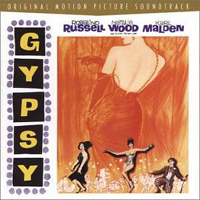 Film Soundtrack, 1962 (Warner Bros.lRhino-Turner)
Film Soundtrack, 1962 (Warner Bros.lRhino-Turner)  (4 / 5) It took a long time for the Gypsy soundtrack album to show up on CD, but this Rhino release proved to be well worth the wait. George Feltenstein did an excellent job of producing the disc and writing the informative notes. The recording was remastered, and the complete version of “Dainty June and Her Newsboys” is included. The biggest bonus of all is the added tracks of Rosalind Russell singing Rose’s songs, which were almost entirely dubbed for the film by Lisa Kirk. In Russell’s autobiography, she insists that she did all of her own singing in Gypsy, but that’s simply not true; only her vocals for “Mr. Goldstone, I Love You” and some sections of “Rose’s Turn” made the final cut of the film, but Kirk’s dubbing of the other songs is very skillful. In general, Russell acts the songs wonderfully well, yet her singing leaves much to be desired. However, in “Together,” which was cut from the movie, she sings delightfully, as do Natalie Wood and Karl Malden. Wood’s “Little Lamb” is touching if not pretty, and she sounds fine duetting with Ann Jillian in “If Momma Was Married.” As Tulsa, Paul Wallace recreates his Broadway performance of “All I Need Is the Girl.” The Broadway cast’s Faith Dane leads the strippers in “You Gotta Have a Gimmick,” and Malden handles Herbie’s minimal vocals well enough. This CD offers “Rose’s Turn” in two versions: the “album version,” which is all Lisa Kirk, and the film version, which is part Kirk and part Russell. The thrilling overture is conducted by composer Jule Styne. — J.D.
(4 / 5) It took a long time for the Gypsy soundtrack album to show up on CD, but this Rhino release proved to be well worth the wait. George Feltenstein did an excellent job of producing the disc and writing the informative notes. The recording was remastered, and the complete version of “Dainty June and Her Newsboys” is included. The biggest bonus of all is the added tracks of Rosalind Russell singing Rose’s songs, which were almost entirely dubbed for the film by Lisa Kirk. In Russell’s autobiography, she insists that she did all of her own singing in Gypsy, but that’s simply not true; only her vocals for “Mr. Goldstone, I Love You” and some sections of “Rose’s Turn” made the final cut of the film, but Kirk’s dubbing of the other songs is very skillful. In general, Russell acts the songs wonderfully well, yet her singing leaves much to be desired. However, in “Together,” which was cut from the movie, she sings delightfully, as do Natalie Wood and Karl Malden. Wood’s “Little Lamb” is touching if not pretty, and she sounds fine duetting with Ann Jillian in “If Momma Was Married.” As Tulsa, Paul Wallace recreates his Broadway performance of “All I Need Is the Girl.” The Broadway cast’s Faith Dane leads the strippers in “You Gotta Have a Gimmick,” and Malden handles Herbie’s minimal vocals well enough. This CD offers “Rose’s Turn” in two versions: the “album version,” which is all Lisa Kirk, and the film version, which is part Kirk and part Russell. The thrilling overture is conducted by composer Jule Styne. — J.D.
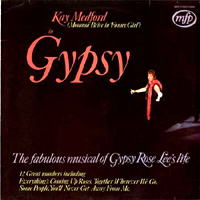 Studio Cast, 1969 (Music For Pleasure/no CD) No stars; not recommended. This is the strangest Gypsy recording of all. Kay Medford had played another showbiz mama, Mrs. Brice, in another Jule Styne musical, Funny Girl, so it may have seemed a good idea to give her a shot at Rose for that reason. But, of course, the vocal demands of the Gypsy role are vastly greater. Produced by Norman Newell and featuring something close to the original orchestrations, this recording was made in London. Its first oddity comes in “Some People,” when Medford sings a rarely heard lyric: “Some people can sit and stare, living life in a rocking chair.” Her sliding into notes here is regrettable, but then she unexpectedly captures you with a rendition of “Small World” that’s nicely sung and well interpreted. Medford works hard in “Everything’s Coming Up Roses,” but her acting doesn’t compensate for her singing, especially not at the climax of the number. As for the other performers heard briefly on the album: In “If Momma Was Married,” the Louise is boring while the June sounds very British and doesn’t sing well, and in “All I Need Is the Girl,” the Tulsa comes across like a London chorus boy rather than a would-be vaudevillian. The strippers are fine — but after all, “You Gotta Have a Gimmick” is almost indestructible. The recording ends with Medford’s rather grim performance of “Rose’s Turn.” — J.D.
Studio Cast, 1969 (Music For Pleasure/no CD) No stars; not recommended. This is the strangest Gypsy recording of all. Kay Medford had played another showbiz mama, Mrs. Brice, in another Jule Styne musical, Funny Girl, so it may have seemed a good idea to give her a shot at Rose for that reason. But, of course, the vocal demands of the Gypsy role are vastly greater. Produced by Norman Newell and featuring something close to the original orchestrations, this recording was made in London. Its first oddity comes in “Some People,” when Medford sings a rarely heard lyric: “Some people can sit and stare, living life in a rocking chair.” Her sliding into notes here is regrettable, but then she unexpectedly captures you with a rendition of “Small World” that’s nicely sung and well interpreted. Medford works hard in “Everything’s Coming Up Roses,” but her acting doesn’t compensate for her singing, especially not at the climax of the number. As for the other performers heard briefly on the album: In “If Momma Was Married,” the Louise is boring while the June sounds very British and doesn’t sing well, and in “All I Need Is the Girl,” the Tulsa comes across like a London chorus boy rather than a would-be vaudevillian. The strippers are fine — but after all, “You Gotta Have a Gimmick” is almost indestructible. The recording ends with Medford’s rather grim performance of “Rose’s Turn.” — J.D.
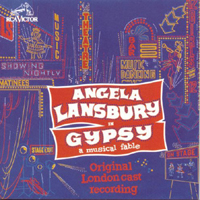 Original London Cast, 1973 (RCA)
Original London Cast, 1973 (RCA)  (4 / 5) London didn’t get to see Gypsy until 1973, when Angela Lansbury starred as Rose under the direction of the show’s librettist, Arthur Laurents. When the eagerly awaited cast album arrived on these shores, listeners were immediately taken with the star’s fresh approach to the character. Lansbury’s Rose was electric in a totally different way from Merman’s. There were some revisions in the songs for this production; for example, “The Strip” (“Let Me Entertain You”) now has Louise/Gypsy speaking to the audience in addition to singing and changing outfits. Barrie Ingham, as Herbie, makes the most of his musical moments, and Zan Charisse is perfect as Louise. The vaudeville sequences have been telescoped into something called “Let Me Entertain You” (Montage) that gives us some of Bonnie Langford’s hilarious Baby June and some of Debbie Bowen’s Dainty June. On the LP, Lansbury’s tracks were a bit raw but amazingly vital; she was also the first Rose on record to sing the final note of “Some People” as written in the score, to thrilling effect. However, when the album was issued in the United States, it was apparent that Lansbury had re-recorded some of her solo tracks. Those performances, retained on the CD, are somewhat lacking in immediacy and excitement as compared with the others. Still, in both versions, Lansbury’s “Everything’s Coming Up Roses” is powerful, and her “Rose’s Turn” is classic. — J.D.
(4 / 5) London didn’t get to see Gypsy until 1973, when Angela Lansbury starred as Rose under the direction of the show’s librettist, Arthur Laurents. When the eagerly awaited cast album arrived on these shores, listeners were immediately taken with the star’s fresh approach to the character. Lansbury’s Rose was electric in a totally different way from Merman’s. There were some revisions in the songs for this production; for example, “The Strip” (“Let Me Entertain You”) now has Louise/Gypsy speaking to the audience in addition to singing and changing outfits. Barrie Ingham, as Herbie, makes the most of his musical moments, and Zan Charisse is perfect as Louise. The vaudeville sequences have been telescoped into something called “Let Me Entertain You” (Montage) that gives us some of Bonnie Langford’s hilarious Baby June and some of Debbie Bowen’s Dainty June. On the LP, Lansbury’s tracks were a bit raw but amazingly vital; she was also the first Rose on record to sing the final note of “Some People” as written in the score, to thrilling effect. However, when the album was issued in the United States, it was apparent that Lansbury had re-recorded some of her solo tracks. Those performances, retained on the CD, are somewhat lacking in immediacy and excitement as compared with the others. Still, in both versions, Lansbury’s “Everything’s Coming Up Roses” is powerful, and her “Rose’s Turn” is classic. — J.D.
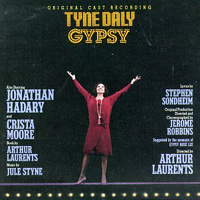 Broadway Cast, 1990 (Elektra-Nonesuch)
Broadway Cast, 1990 (Elektra-Nonesuch)  (2 / 5) Tyne Daly was reported to be having vocal problems when this album was made, but if that’s true, it doesn’t seem to have daunted her in the role of Rose. The recording includes some dialogue which enhances the enjoyment of her performance. Daly and Jonathan Hadary turn “Small World” into a gem of a duet. While Daly’s voice does show some signs of wear in “Everything’s Coming Up Roses,” the introductory spoken lines propel her into singing with a desperation that really makes the number land. Crista Moore is mostly good as Louise, but “The Strip,” in a newly rewritten version, is weak. The strippers — Barbara Erwin, Jana Robbins, and Anna McNeely — display loads of showbiz savvy in “You Gotta Have a Gimmick,” and Robert Lambert is a solid Tulsa. As for “Rose’s Turn,” it begins almost as a toss-off, but then Daly gradually gains intensity and growls her way to an almost defeated ending. — J.D.
(2 / 5) Tyne Daly was reported to be having vocal problems when this album was made, but if that’s true, it doesn’t seem to have daunted her in the role of Rose. The recording includes some dialogue which enhances the enjoyment of her performance. Daly and Jonathan Hadary turn “Small World” into a gem of a duet. While Daly’s voice does show some signs of wear in “Everything’s Coming Up Roses,” the introductory spoken lines propel her into singing with a desperation that really makes the number land. Crista Moore is mostly good as Louise, but “The Strip,” in a newly rewritten version, is weak. The strippers — Barbara Erwin, Jana Robbins, and Anna McNeely — display loads of showbiz savvy in “You Gotta Have a Gimmick,” and Robert Lambert is a solid Tulsa. As for “Rose’s Turn,” it begins almost as a toss-off, but then Daly gradually gains intensity and growls her way to an almost defeated ending. — J.D.
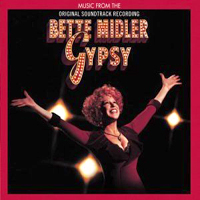 Television Film Soundtrack, 1993 (Atlantic)
Television Film Soundtrack, 1993 (Atlantic)  (3 / 5) The TV movie of Gypsy starring Bette Midler is textually faithful to the stage version of the musical. The production was controversial; many fans of the show had trouble accepting Midler as Rose, but hers is an estimable performance, and this soundtrack recording has much to offer. To start with, Michael Rafter does a fine job with the beloved overture — but now the quibbles begin. The recording includes almost no dialogue, although we do get to hear Ed Asner’s recognizable voice as Pop in “Some People.” The lack of spoken lines limits the dramatic impact of “Small World,” “You’ll Never Get Away From Me,” and “Together,” even if these numbers benefit greatly from the very pleasant presence of Peter Riegert as Herbie. For whatever reasons, much of what’s good about the film doesn’t translate to the soundtrack recordnig. Cynthia Gibb doesn’t make a strong vocal impression as Louise; her “Let Me Entertain You” is only saved by some voice-overs tracing her climb to Minsky’s. Also, neither “All I Need Is the Girl” nor “You Gotta Have a Gimmick” register strongly without the visuals. But then there is Midler. According to producer Craig Zadan’s notes, the star performed most of her vocals live. The spontaneity and verve that she brings to this classic score must be partly credited to that wise choice, one so rarely made when musicals are filmed. “Some People” bristles, “Small World” allows Rose to melt Herbie with a creamy vocal, and “Everything’s Coming Up Roses” is suitably scary. The glory of the disc is Midler’s superb “Rose’s Turn”; she acts her way through every moment of the number with enormous guts, bringing it to a searing climax. — J.D.
(3 / 5) The TV movie of Gypsy starring Bette Midler is textually faithful to the stage version of the musical. The production was controversial; many fans of the show had trouble accepting Midler as Rose, but hers is an estimable performance, and this soundtrack recording has much to offer. To start with, Michael Rafter does a fine job with the beloved overture — but now the quibbles begin. The recording includes almost no dialogue, although we do get to hear Ed Asner’s recognizable voice as Pop in “Some People.” The lack of spoken lines limits the dramatic impact of “Small World,” “You’ll Never Get Away From Me,” and “Together,” even if these numbers benefit greatly from the very pleasant presence of Peter Riegert as Herbie. For whatever reasons, much of what’s good about the film doesn’t translate to the soundtrack recordnig. Cynthia Gibb doesn’t make a strong vocal impression as Louise; her “Let Me Entertain You” is only saved by some voice-overs tracing her climb to Minsky’s. Also, neither “All I Need Is the Girl” nor “You Gotta Have a Gimmick” register strongly without the visuals. But then there is Midler. According to producer Craig Zadan’s notes, the star performed most of her vocals live. The spontaneity and verve that she brings to this classic score must be partly credited to that wise choice, one so rarely made when musicals are filmed. “Some People” bristles, “Small World” allows Rose to melt Herbie with a creamy vocal, and “Everything’s Coming Up Roses” is suitably scary. The glory of the disc is Midler’s superb “Rose’s Turn”; she acts her way through every moment of the number with enormous guts, bringing it to a searing climax. — J.D.
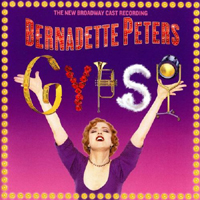 Broadway Cast, 2003 (Angel)
Broadway Cast, 2003 (Angel)  (3 / 5) Whatever one may have thought of this production, the cast album was the most complete preservation of the Gypsy score to be found on a recording up to that time. Almost every track includes dialogue, and there is a great deal of incidental music and underscoring. Bernadette Peters’ Rose is as unique to her personality as her predecessors’ takes on the role were to theirs; she defines the character in her own special way. What comes through on the recording is her variance between charm (“Small World”), strength (“Some People”), vulnerability (the “Small World” reprise), and ferocity (“Everything’s Coming Up Roses”). Peters skillfully juggles all these aspects of the role, finally allowing them to collide brilliantly in “Rose’s Turn.” Tammy Blanchard is not fully convincing as Louise in yet another new version of the “Gypsy Strip,” nor is she very effective in “Little Lamb,” and she’s only a little bit better when singing “If Momma Was Married” with Kate Reinders. John Dossett and David Burtka are far more persuasive as Herbie and Tulsa, respectively. The three strippers — Kate Buddeke, Julie Halston, and Heather Lee — are right-on in “You Gotta Have a Gimmick.” — J.D.
(3 / 5) Whatever one may have thought of this production, the cast album was the most complete preservation of the Gypsy score to be found on a recording up to that time. Almost every track includes dialogue, and there is a great deal of incidental music and underscoring. Bernadette Peters’ Rose is as unique to her personality as her predecessors’ takes on the role were to theirs; she defines the character in her own special way. What comes through on the recording is her variance between charm (“Small World”), strength (“Some People”), vulnerability (the “Small World” reprise), and ferocity (“Everything’s Coming Up Roses”). Peters skillfully juggles all these aspects of the role, finally allowing them to collide brilliantly in “Rose’s Turn.” Tammy Blanchard is not fully convincing as Louise in yet another new version of the “Gypsy Strip,” nor is she very effective in “Little Lamb,” and she’s only a little bit better when singing “If Momma Was Married” with Kate Reinders. John Dossett and David Burtka are far more persuasive as Herbie and Tulsa, respectively. The three strippers — Kate Buddeke, Julie Halston, and Heather Lee — are right-on in “You Gotta Have a Gimmick.” — J.D.
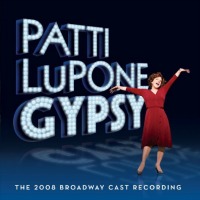 Broadway Cast, 2008 (Time-Life Music)
Broadway Cast, 2008 (Time-Life Music)  (2 / 5) Before Patti LuPone played Rose in Gypsy at the Ravinia Festival, later in a limited run at City Center in New York, and then on Broadway in 2008, the idea of her eventually tackling the role seemed a great one. As it turned out, LuPone won a Tony Award for her efforts, but this recording preserves the broad vocal mannerisms of her performance, which some listeners may consider to be intrusive, overly affected, and self indulgent. Those mannerisms include alternation between straight-tone singing and a normal use of vibrato, fairly frequent and obvious flipping from chest voice to head voice, more than a few wildly distorted vowels — e.g., the word “roses” is repeatedly sung as “rozazz” — and the decision to speak or shout rather than sing in some key moments. The Broadway production was flagrantly over-directed as if with a whip by Arthur Laurents, who wrote the book for the show, and that liability is all too accurately reflected on the cast album; to one degree or another, almost everyone in the company suffers at Laurents’ hand. In the “Madame Rose’s Toreadorables” cut, just listen to the horribly shrieking girls and the wildly exaggerated awfulness of Laura Benanti as Louise’s line reading, “Olé, everybody, my name’s Louise, what’s yours?” (Louise states more than once that she has no talent, but nobody has that much no-talent.) Similarly, although Leigh-Ann Larkin sings very well as Dainty June, she’s over-the-top terrible in her spoken lines in “Dainty June and Her Farmboys.” Boyd Gaines offers a warmly human Herbie under difficult circumstances, Tony Yazbeck is a charming Tulsa in “All I Need is the Girl,” and Benanti’s Louise is very persuasive when Laurents leaves her alone; her “Little Lamb” may well be the most moving version ever recorded. Some unfortunate fussing with tempi aside, the orchestra sounds great under Patrick Vaccariello. This album holds some special interest for its inclusion of several songs that were cut from the show at one point or another as bonus tracks, but the performance of the bulk of the score is highly problematic. — Michael Portantiere
(2 / 5) Before Patti LuPone played Rose in Gypsy at the Ravinia Festival, later in a limited run at City Center in New York, and then on Broadway in 2008, the idea of her eventually tackling the role seemed a great one. As it turned out, LuPone won a Tony Award for her efforts, but this recording preserves the broad vocal mannerisms of her performance, which some listeners may consider to be intrusive, overly affected, and self indulgent. Those mannerisms include alternation between straight-tone singing and a normal use of vibrato, fairly frequent and obvious flipping from chest voice to head voice, more than a few wildly distorted vowels — e.g., the word “roses” is repeatedly sung as “rozazz” — and the decision to speak or shout rather than sing in some key moments. The Broadway production was flagrantly over-directed as if with a whip by Arthur Laurents, who wrote the book for the show, and that liability is all too accurately reflected on the cast album; to one degree or another, almost everyone in the company suffers at Laurents’ hand. In the “Madame Rose’s Toreadorables” cut, just listen to the horribly shrieking girls and the wildly exaggerated awfulness of Laura Benanti as Louise’s line reading, “Olé, everybody, my name’s Louise, what’s yours?” (Louise states more than once that she has no talent, but nobody has that much no-talent.) Similarly, although Leigh-Ann Larkin sings very well as Dainty June, she’s over-the-top terrible in her spoken lines in “Dainty June and Her Farmboys.” Boyd Gaines offers a warmly human Herbie under difficult circumstances, Tony Yazbeck is a charming Tulsa in “All I Need is the Girl,” and Benanti’s Louise is very persuasive when Laurents leaves her alone; her “Little Lamb” may well be the most moving version ever recorded. Some unfortunate fussing with tempi aside, the orchestra sounds great under Patrick Vaccariello. This album holds some special interest for its inclusion of several songs that were cut from the show at one point or another as bonus tracks, but the performance of the bulk of the score is highly problematic. — Michael Portantiere
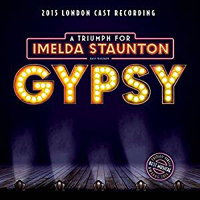 London Cast, 2015 (First Night Records)
London Cast, 2015 (First Night Records)  (2 / 5) The most praiseworthy aspect of Imelda Staunton’s performance as Rose is the quality of her singing when judged from a purely musical standpoint. A live commercial video of this 2015 London production of Gypsy reveals a portrayal of the role that some have rated as aggressively over-acted, strident, lacking in charm, and more “indicated” than felt. But on the cast album, which of course focuses on the show’s musical moments and includes not much dialogue, Staunton comes across much better. She also deserves credit for her well-done American accent, a few “anuhthings” and “everuhthings” aside. On that note, compared to the 1973 London cast recording with Angela Lansbury, the accent work of the ensemble here is generally far superior; the “newsboys,” for example, sound convincingly American, rather than like a bunch of urchins who wandered in from Oliver! The supporting cast is generally fine, especially Lara Pulver as Louise. But while the orchestrations for reduced forces are well done for what they are, a full string section is sorely missed at several points in the score, such as the phenomenal “Overture.” That’s a major disappointment of this recording. — M.P.
(2 / 5) The most praiseworthy aspect of Imelda Staunton’s performance as Rose is the quality of her singing when judged from a purely musical standpoint. A live commercial video of this 2015 London production of Gypsy reveals a portrayal of the role that some have rated as aggressively over-acted, strident, lacking in charm, and more “indicated” than felt. But on the cast album, which of course focuses on the show’s musical moments and includes not much dialogue, Staunton comes across much better. She also deserves credit for her well-done American accent, a few “anuhthings” and “everuhthings” aside. On that note, compared to the 1973 London cast recording with Angela Lansbury, the accent work of the ensemble here is generally far superior; the “newsboys,” for example, sound convincingly American, rather than like a bunch of urchins who wandered in from Oliver! The supporting cast is generally fine, especially Lara Pulver as Louise. But while the orchestrations for reduced forces are well done for what they are, a full string section is sorely missed at several points in the score, such as the phenomenal “Overture.” That’s a major disappointment of this recording. — M.P.
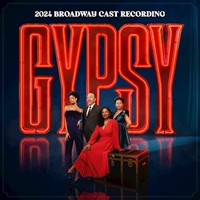 Broadway Cast, 2025 (Warner Music Group/Arts Music/Octoverse Media)
Broadway Cast, 2025 (Warner Music Group/Arts Music/Octoverse Media)  (1 / 5) Audra McDonald is acknowledged as one of the most talented musical theater performers in history, but not even the greatest of stars can do it all. When it was first reported that McDonald would be playing Rose in a new Broadway production of Gypsy — a project she had publicly denied was going to happen, for whatever reason — even some of her greatest fans were surprised by the announcement, because they felt she might be miscast in this bravura role if only from a purely vocal standpoint. As written by Jule Styne and Stephen Sondheim, Rose’s songs were designed to fit the clarion Broadway belt singing style of Ethel Merman, and since then have been sung in the alto belt range by every woman who has played the role in all of the show’s Broadway revivals. Until this one. Two examples of many from the cast album starring McDonald: In Rose’s character establishing song “Some People,” the word “I” in the line “But I-I-I-I at least gotta try” is meant to be belted out of the park, but here’s it’s sung with a far less powerful, lower-register soprano “mix” quality, to very little vocal or dramatic effect. And at the climax of the recording, presumably because McDonald didn’t want to belt the end of “Rose’s Turn” but recognized that it would sound ridiculous if sung with a soprano timbre, she screams and sobs the bulk of the last half of the song with an alarming loss of control. Elsewhere throughout the album, in order to accommodate McDonald’s desire to sing much of the role in her soprano voice, there are numerous transpositions and even modulations within songs, most of them jarring. On top of all the above, McDonald’s performance throughout features so much back-phrasing and so many ill-judged pauses for “effect” that the forward momentum of the music is severely compromised. Further demerits of the album include an unbearably screechy rendition of the “Moo Cow” song by Jordan Tyson as a far-from-dainty June; overacting to the point of vulgarity by Lili Thomas, Mylinda Hull, and Lesli Margherita as the three strippers; lackluster new arrangements and, in some cases, inferior rewriting of the dance music; and conductor Andy Einhorn’s reliance on ritards and rallentandos even more annoying than those heard on the Patti LuPone recording. Some good news: Broadway veteran Danny Burstein is a delight as Herbie, and Joy Woods as Louise offers a touching rendition of “Little Lamb.” But McDonald’s controversial vocal performance and the other serious flaws of this album may cause many listeners to rate it as a highly unsatisfying entry in the discography of a true masterpiece. – M.P.
(1 / 5) Audra McDonald is acknowledged as one of the most talented musical theater performers in history, but not even the greatest of stars can do it all. When it was first reported that McDonald would be playing Rose in a new Broadway production of Gypsy — a project she had publicly denied was going to happen, for whatever reason — even some of her greatest fans were surprised by the announcement, because they felt she might be miscast in this bravura role if only from a purely vocal standpoint. As written by Jule Styne and Stephen Sondheim, Rose’s songs were designed to fit the clarion Broadway belt singing style of Ethel Merman, and since then have been sung in the alto belt range by every woman who has played the role in all of the show’s Broadway revivals. Until this one. Two examples of many from the cast album starring McDonald: In Rose’s character establishing song “Some People,” the word “I” in the line “But I-I-I-I at least gotta try” is meant to be belted out of the park, but here’s it’s sung with a far less powerful, lower-register soprano “mix” quality, to very little vocal or dramatic effect. And at the climax of the recording, presumably because McDonald didn’t want to belt the end of “Rose’s Turn” but recognized that it would sound ridiculous if sung with a soprano timbre, she screams and sobs the bulk of the last half of the song with an alarming loss of control. Elsewhere throughout the album, in order to accommodate McDonald’s desire to sing much of the role in her soprano voice, there are numerous transpositions and even modulations within songs, most of them jarring. On top of all the above, McDonald’s performance throughout features so much back-phrasing and so many ill-judged pauses for “effect” that the forward momentum of the music is severely compromised. Further demerits of the album include an unbearably screechy rendition of the “Moo Cow” song by Jordan Tyson as a far-from-dainty June; overacting to the point of vulgarity by Lili Thomas, Mylinda Hull, and Lesli Margherita as the three strippers; lackluster new arrangements and, in some cases, inferior rewriting of the dance music; and conductor Andy Einhorn’s reliance on ritards and rallentandos even more annoying than those heard on the Patti LuPone recording. Some good news: Broadway veteran Danny Burstein is a delight as Herbie, and Joy Woods as Louise offers a touching rendition of “Little Lamb.” But McDonald’s controversial vocal performance and the other serious flaws of this album may cause many listeners to rate it as a highly unsatisfying entry in the discography of a true masterpiece. – M.P.
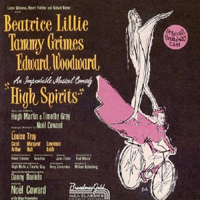 Original Broadway Cast, 1964 (ABC-Paramount/MCA)
Original Broadway Cast, 1964 (ABC-Paramount/MCA)  (3 / 5) Noël Coward’s martini-dry farce Blithe Spirit was turned into a brassy, uptempo musical by songwriters-librettists Hugh Marrin and Timothy Gray. If the result is a bit disconcerting, it’s still a droll entertainment. (Coward himself directed.) Edward Woodward is Charles Condomine, whose experiments with spiritualism accidentally conjure the spirit of his first wife, Elvira (Tammy Grimes), much to the horror of his current spouse, Ruth (Louise Troy). Along for the ride is Beatrice Lillie as the bizarre medium Madame Arcati. The songs are generally very aggressive — Harry Zimmerman’s orchestrations are hell-bent on turning this piece of fluff into a blockbuster — yet they’re also witty and melodic. Grimes gets the choice material, including the lighthearted warning “You’d Better Love Me,” the introspective”Something Tells Me,” and the wacky jet-set spoof “Faster Than Sound.” She absolutely sizzles when describing her social life on the astral plane in “Home Sweet Heaven” (“Delilah’s dreary / But Samson’s handsome / And with his good looks / Robin Hood looks fit for ransom”). Some fans of Lillie claim that you had to see her perform to get her, but she’s fun in her recordings of “Go Into Your Trance” and “Something Is Coming to Tea,” and especially when singing sweet nothings to her Ouija board in “Talking to You.” In less flamboyant roles, Woodward and Troy are models of urbanity. — David Barbour
(3 / 5) Noël Coward’s martini-dry farce Blithe Spirit was turned into a brassy, uptempo musical by songwriters-librettists Hugh Marrin and Timothy Gray. If the result is a bit disconcerting, it’s still a droll entertainment. (Coward himself directed.) Edward Woodward is Charles Condomine, whose experiments with spiritualism accidentally conjure the spirit of his first wife, Elvira (Tammy Grimes), much to the horror of his current spouse, Ruth (Louise Troy). Along for the ride is Beatrice Lillie as the bizarre medium Madame Arcati. The songs are generally very aggressive — Harry Zimmerman’s orchestrations are hell-bent on turning this piece of fluff into a blockbuster — yet they’re also witty and melodic. Grimes gets the choice material, including the lighthearted warning “You’d Better Love Me,” the introspective”Something Tells Me,” and the wacky jet-set spoof “Faster Than Sound.” She absolutely sizzles when describing her social life on the astral plane in “Home Sweet Heaven” (“Delilah’s dreary / But Samson’s handsome / And with his good looks / Robin Hood looks fit for ransom”). Some fans of Lillie claim that you had to see her perform to get her, but she’s fun in her recordings of “Go Into Your Trance” and “Something Is Coming to Tea,” and especially when singing sweet nothings to her Ouija board in “Talking to You.” In less flamboyant roles, Woodward and Troy are models of urbanity. — David Barbour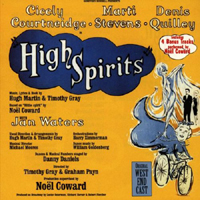 Original London Cast, 1964 (Pye/DRG)
Original London Cast, 1964 (Pye/DRG)  (3 / 5) Coward tried again, this time without Lillie, and what was a nervous hit in New York was a flat-out flop in London. The cast album isn’t bad, but it lacks the exciting personalities of the New York original. Tammy Grimes, with her smoky voice and singular delivery, is much missed. Her replacement, Marti Stevens, does not for a moment suggest the eccentric, ectoplasmic Elvira. Cicely Courtneidge is fun as Madame Arcati, and Dennis Quilley is a really first-rate Charles, but Jan Waters as Ruth lacks Louise Troy’s apt, world-weary manner. Still, the recording is worthwhile for several reasons: “Home Sweet Heaven” has some new, even more riotous lyrics (“The King of Prussia / I call him Freddy / Is living by mistake / With Mary Baker Eddy”), and a set of bonus tracks features Coward himself singing “Something Tells Me,” the ballads “If I Gave You” and “Forever and a Day,” and what may be the definitive version of “Home Sweet Heaven.” — D.B.
(3 / 5) Coward tried again, this time without Lillie, and what was a nervous hit in New York was a flat-out flop in London. The cast album isn’t bad, but it lacks the exciting personalities of the New York original. Tammy Grimes, with her smoky voice and singular delivery, is much missed. Her replacement, Marti Stevens, does not for a moment suggest the eccentric, ectoplasmic Elvira. Cicely Courtneidge is fun as Madame Arcati, and Dennis Quilley is a really first-rate Charles, but Jan Waters as Ruth lacks Louise Troy’s apt, world-weary manner. Still, the recording is worthwhile for several reasons: “Home Sweet Heaven” has some new, even more riotous lyrics (“The King of Prussia / I call him Freddy / Is living by mistake / With Mary Baker Eddy”), and a set of bonus tracks features Coward himself singing “Something Tells Me,” the ballads “If I Gave You” and “Forever and a Day,” and what may be the definitive version of “Home Sweet Heaven.” — D.B.


 (1 / 5) Ervin Drake’s score for this show doesn’t actually contain terrible songs; it’s just that they’re terrible for an adaptation of George Bernard Shaw’s Caesar and Cleopatra. The title of the opening number, “What Are We Doing in Egypt?”, might well prompt us to ask: What are these songs doing in Egypt? That mismatch is probably why a quarter-century had to pass before someone made a full-fledged recording of this 1968 flop. As Caesar, Richard Kiley sings of being in “The Dangerous Age,” where he’s smitten with the sex-kitten Cleopatra, played by Leslie Uggams. Her songs include “I Cannot Make Him Jealous (I Have Tried),” with its frustrating stop-and-start melody; “Many Young Men From Now,” which sounds like a running-up-and-down-the scale vocal exercise; and, most atrociously, “The Wrong Man’s the Right Man for Me,” which calls to mind a snazzy nightclub song. Similarly, the title song is far too Jerry Hermanish for the period — not to mention that a Shaw-inspired musical should have opted for a more elegant title. Just when the listener is convinced that things could not possibly get worse, out comes the most awful item of all: “I Fell in With Evil Companions,” an anachronistic rouser that Caesar and his soldiers sing for no apparent reason. It was dropped during the Boston tryout, but it’s included here for better or worse — with an emphasis on the latter. — Peter Filichia
(1 / 5) Ervin Drake’s score for this show doesn’t actually contain terrible songs; it’s just that they’re terrible for an adaptation of George Bernard Shaw’s Caesar and Cleopatra. The title of the opening number, “What Are We Doing in Egypt?”, might well prompt us to ask: What are these songs doing in Egypt? That mismatch is probably why a quarter-century had to pass before someone made a full-fledged recording of this 1968 flop. As Caesar, Richard Kiley sings of being in “The Dangerous Age,” where he’s smitten with the sex-kitten Cleopatra, played by Leslie Uggams. Her songs include “I Cannot Make Him Jealous (I Have Tried),” with its frustrating stop-and-start melody; “Many Young Men From Now,” which sounds like a running-up-and-down-the scale vocal exercise; and, most atrociously, “The Wrong Man’s the Right Man for Me,” which calls to mind a snazzy nightclub song. Similarly, the title song is far too Jerry Hermanish for the period — not to mention that a Shaw-inspired musical should have opted for a more elegant title. Just when the listener is convinced that things could not possibly get worse, out comes the most awful item of all: “I Fell in With Evil Companions,” an anachronistic rouser that Caesar and his soldiers sing for no apparent reason. It was dropped during the Boston tryout, but it’s included here for better or worse — with an emphasis on the latter. — Peter Filichia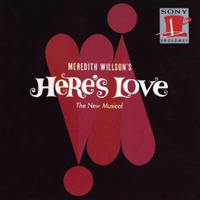
 (2 / 5) Here is an industrial-strength musical version of the Christmas movie classic Miracle on 34th Street. Directed by its producer, Stuart Ostrow, after Norman Jewison departed during the tryout, Here’s Love was Meredith Willson’s third Broadway effort, following The Music Man and The Unsinkable Molly Brown. It was helped along to a 334-performance run by a fine cast, a healthy advance sale, and a sumptuous production that featured choreographer Michael Kidd’s re-creation of the Macy’s Thanksgiving Day Parade. The album magnifies the show’s major flaw: its middling score, which will likely remind the listener of better songs from previous musicals by Willson, who wrote this show’s book, music, and lyrics. Things start off promisingly enough with “The Big Clown Balloons.” There’s also a perky title song that’s determined to blast its way into every theatergoer’s heart. But then Willson resorts to interpolating his old hit “It’s Beginning to Look a Lot Like Christmas,” a Yuletide chestnut and the most memorable tune on the album. Otherwise, the score consists of generic songs that could work just as well in Act I or Act II, or even be dropped into any other so-so musical. But, uninspired as the score is, at least it’s well presented here in bright orchestrations by Don Walker and dance-music arrangements by Peter Howard. Janis Paige brings considerable warmth and zest to such material as the reprise of a mediocre song titled “Look, Little Girl.” Her pitch-approximate intonation and frequent switching of vocal registers in “My State” make for a highly individual sound, but her charisma is irresistible throughout the recording. Craig Stevens and the men gamely work to put over “She Hadda Go Back,” salvaged from what must have been the bottom drawer of Willson’s trunk. Laurence Naismith and Valerie Lee also give appealing vocal performances. — Morgan Sills
(2 / 5) Here is an industrial-strength musical version of the Christmas movie classic Miracle on 34th Street. Directed by its producer, Stuart Ostrow, after Norman Jewison departed during the tryout, Here’s Love was Meredith Willson’s third Broadway effort, following The Music Man and The Unsinkable Molly Brown. It was helped along to a 334-performance run by a fine cast, a healthy advance sale, and a sumptuous production that featured choreographer Michael Kidd’s re-creation of the Macy’s Thanksgiving Day Parade. The album magnifies the show’s major flaw: its middling score, which will likely remind the listener of better songs from previous musicals by Willson, who wrote this show’s book, music, and lyrics. Things start off promisingly enough with “The Big Clown Balloons.” There’s also a perky title song that’s determined to blast its way into every theatergoer’s heart. But then Willson resorts to interpolating his old hit “It’s Beginning to Look a Lot Like Christmas,” a Yuletide chestnut and the most memorable tune on the album. Otherwise, the score consists of generic songs that could work just as well in Act I or Act II, or even be dropped into any other so-so musical. But, uninspired as the score is, at least it’s well presented here in bright orchestrations by Don Walker and dance-music arrangements by Peter Howard. Janis Paige brings considerable warmth and zest to such material as the reprise of a mediocre song titled “Look, Little Girl.” Her pitch-approximate intonation and frequent switching of vocal registers in “My State” make for a highly individual sound, but her charisma is irresistible throughout the recording. Craig Stevens and the men gamely work to put over “She Hadda Go Back,” salvaged from what must have been the bottom drawer of Willson’s trunk. Laurence Naismith and Valerie Lee also give appealing vocal performances. — Morgan Sills
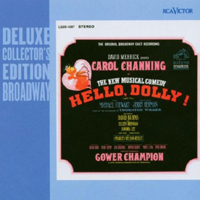
 (4 / 5) If one composer’s name leaps to mind when the phrase “show tune” is used, it’s probably Jerry Herman; and if one show epitomizes Herman’s work, it’s Hello, Dolly! The “Prologue” of this recording — a brief but thrilling orchestral arrangement of the monster-hit title song, created especially for the album — sets the mood. From there to the finale, it’s treat after treat, with “Put on Your Sunday Clothes” registering as one of the most exciting songs ever written for the American musical theater. There are a couple of grammatical errors in the show’s lyrics — e.g., “I have always been a woman who arranges things, for the pleasure and the profit it derives.” But this is a wonderful score, and the original cast recording is a cornerstone of many people’s collections, even if the whole is greater than the sum of its parts. Charles Nelson Reilly, so delightful in the comic character role of Bud Frump in How to Succeed in Business Without Really Trying, is less persuasive here as the more leading-mannish Cornelius Hackl. Opposite him, Eileen Brennan sings “Ribbons Down My Back” and other songs in a stilted soprano that worked for her campy role in Little Mary Sunshine but is inappropriate for the straightforward Irene Molloy. On the plus side, David Burns is fun in what little he gets to sing as Horace Vandergelder. Of course, the main attraction here is Carol Channing’s portrayal of Dolly Gallagher Levi — a one-of-a-kind, daffy, brilliantly comic performance. The chorus members sing with energy, but in an oddly clipped fashion that sometimes makes them sound angry; however, the orchestra is terrific throughout as recorded in super-duper stereo. (Shepard Coleman is listed as musical director/vocal arranger.) Note that the songs “Motherhood” and “Elegance” were written at least in part by Bob Merrill, who pitched in when the show was in trouble out of town pre-Broadway. Included as bonus tracks on the “Broadway Deluxe Collector’s Edition” CD are two cuts each from the London cast album starring Mary Martin and the 1967 Broadway cast album starring Pearl Bailey, plus Ethel Merman’s renditions (with piano accompaniment) of two songs that were reinstated when she starred as Dolly at the end of the show’s seven-year Broadway run. There’s also an amusing interview with Carol Channing. — Michael Portantiere
(4 / 5) If one composer’s name leaps to mind when the phrase “show tune” is used, it’s probably Jerry Herman; and if one show epitomizes Herman’s work, it’s Hello, Dolly! The “Prologue” of this recording — a brief but thrilling orchestral arrangement of the monster-hit title song, created especially for the album — sets the mood. From there to the finale, it’s treat after treat, with “Put on Your Sunday Clothes” registering as one of the most exciting songs ever written for the American musical theater. There are a couple of grammatical errors in the show’s lyrics — e.g., “I have always been a woman who arranges things, for the pleasure and the profit it derives.” But this is a wonderful score, and the original cast recording is a cornerstone of many people’s collections, even if the whole is greater than the sum of its parts. Charles Nelson Reilly, so delightful in the comic character role of Bud Frump in How to Succeed in Business Without Really Trying, is less persuasive here as the more leading-mannish Cornelius Hackl. Opposite him, Eileen Brennan sings “Ribbons Down My Back” and other songs in a stilted soprano that worked for her campy role in Little Mary Sunshine but is inappropriate for the straightforward Irene Molloy. On the plus side, David Burns is fun in what little he gets to sing as Horace Vandergelder. Of course, the main attraction here is Carol Channing’s portrayal of Dolly Gallagher Levi — a one-of-a-kind, daffy, brilliantly comic performance. The chorus members sing with energy, but in an oddly clipped fashion that sometimes makes them sound angry; however, the orchestra is terrific throughout as recorded in super-duper stereo. (Shepard Coleman is listed as musical director/vocal arranger.) Note that the songs “Motherhood” and “Elegance” were written at least in part by Bob Merrill, who pitched in when the show was in trouble out of town pre-Broadway. Included as bonus tracks on the “Broadway Deluxe Collector’s Edition” CD are two cuts each from the London cast album starring Mary Martin and the 1967 Broadway cast album starring Pearl Bailey, plus Ethel Merman’s renditions (with piano accompaniment) of two songs that were reinstated when she starred as Dolly at the end of the show’s seven-year Broadway run. There’s also an amusing interview with Carol Channing. — Michael Portantiere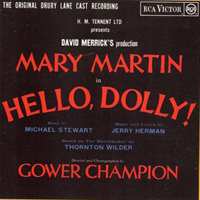
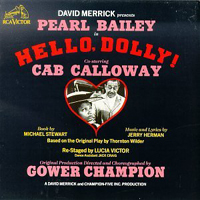
 (5 / 5) In order to rekindle interest in Hello, Dolly! three years into the show’s run, producer David Merrick brought in an all-black company headed by two iconic performers, Pearl Bailey and Cab Calloway. The exemplary cast album begins with a gorgeous, full-length overture that’s almost too symphonic for this basically light and bouncy show; like the “Prologue” of the original cast album, it was created specifically for the recording. Philip J. Lang’s revamped orchestrations are fabulous, and the performance of the title song is the best ever recorded: Bailey and the male chorus have the time of their lives as saxophones wail, trumpets blare, a banjo strums, and the xylophone player goes nuts. As Dolly, Bailey is a real pistol and very funny as required, but she’s just as strong when delivering the more emotionally weighty “Before the Parade Passes By.” Calloway makes the role of Horace Vandergelder wonderfully his own, even if he’s only heard leading the male-ensemble number “It Takes a Woman” and in the reprise duet of “Hello, Dolly!” with Bailey. Jack Crowder’s rich baritone voice isn’t exactly right for the callow Cornelius, but Crowder sings so beautifully — especially in “It Only Takes a Moment,” one of Herman’s loveliest ballads — that it would be foolish to carp. He’s superbly partnered by Emily Yancy, who brings just enough jazz/pop style to Irene’s songs to make them seem fresh without distortion. By a considerable margin, this is the finest recording of the Hello, Dolly! score. — M.P.
(5 / 5) In order to rekindle interest in Hello, Dolly! three years into the show’s run, producer David Merrick brought in an all-black company headed by two iconic performers, Pearl Bailey and Cab Calloway. The exemplary cast album begins with a gorgeous, full-length overture that’s almost too symphonic for this basically light and bouncy show; like the “Prologue” of the original cast album, it was created specifically for the recording. Philip J. Lang’s revamped orchestrations are fabulous, and the performance of the title song is the best ever recorded: Bailey and the male chorus have the time of their lives as saxophones wail, trumpets blare, a banjo strums, and the xylophone player goes nuts. As Dolly, Bailey is a real pistol and very funny as required, but she’s just as strong when delivering the more emotionally weighty “Before the Parade Passes By.” Calloway makes the role of Horace Vandergelder wonderfully his own, even if he’s only heard leading the male-ensemble number “It Takes a Woman” and in the reprise duet of “Hello, Dolly!” with Bailey. Jack Crowder’s rich baritone voice isn’t exactly right for the callow Cornelius, but Crowder sings so beautifully — especially in “It Only Takes a Moment,” one of Herman’s loveliest ballads — that it would be foolish to carp. He’s superbly partnered by Emily Yancy, who brings just enough jazz/pop style to Irene’s songs to make them seem fresh without distortion. By a considerable margin, this is the finest recording of the Hello, Dolly! score. — M.P.